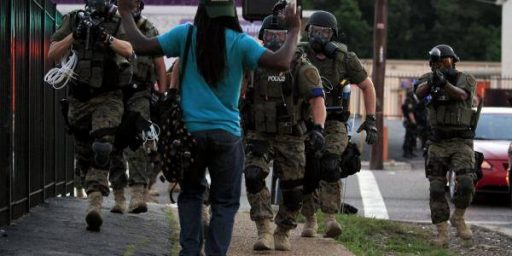Drug War Insanity
Scenes from the war on drugs.
 I would recommend Radley Balko’s piece in WaPo concerning the use of no-knock warrants in Little Rock, Arkansas: Little Rock’s dangerous and illegal drug war.
I would recommend Radley Balko’s piece in WaPo concerning the use of no-knock warrants in Little Rock, Arkansas: Little Rock’s dangerous and illegal drug war.
The video is pretty horrifying: eight or nine (the way the video is cut off, I was not sure of the count) heavily armed individuals literally blow the door off a guy’s apartment because of one allegation (that ended up not to be true, and given by a documented liar) of a sale of cocaine. They later laugh at how awesome it all was when they see the security footage of the raid.
There is something fundamentally wrong with this approach to drug policy. It does not respect basic rights and further contributes to the militarization of the police, which is not healthy for an allegedly free society. Of course, when you call a policy a “war” (especially in the context of armed law enforcement) this is what happens. After all, does not one do what one has to do to win a war?
I recommend the whole piece, which gets into the warrant issue specifically. Also: watch the video clips.






It’s not slavery, or the dispossession and at times genocide of the Indians, or the Mexican-American War, or the Philippines War, or Jim Crow, or Vietnam, but the drug war is an American atrocity committed by the government against our own people, driven in large part by racism and greed.
It has been a shameful undertaking from the start, but with the blithe forgetfulness that characterizes Americans, we’ll la-di-da it away over time and ignore the destroyed lives and subverted institutions so we can keep telling ourselves we’re just the bestest people ever.
Other than the obvious racial aspect, I don’t see why this isn’t a huge problem for the folks on the right who are worried about massive government overreach.
I guess we have to wait for the police to get into a shootout with a white, middle class, conservative dentist who is defending his home against a sudden home invasion — someone who the folks at Red State can identify with. A suitably presentable poster child to police violence.
Otherwise, it’s just Liberals complaining about Brown People getting “mistreated”.
Yep. It will go down in history along with those other things as one of the great horrors visited upon our own people and especially upon black people.
Speaking as someone working in this space, this is generally correct. Criminal justice reform creates really strange bed-fellows. Our organization is funded by groups from both the right and left (who are normally in opposition on major issues).
Reason, and other libertarian organizations, have also been doing a LOT of great work in this area.
Unfortunately, there are still a lot of “tough on crime” Republicans (and some Democrats) who continue to gum up the works.
Agreed. It’s also a really complex history. The reality is that, in many cases, black community leaders played an active role in pushing for a lot of the “tough on crime” regulations in the hope of stemming crime and drug issues within their communities. The overall opacity of US criminal justice systems (which continues to this day) enabled that type of thinking to last for far too long. So feelings outweighed facts and people advocated for policy that was actively harming them.
Weren’t arbitrary arrests, detentions, and violations of civil rights hallmarks of the USSR?